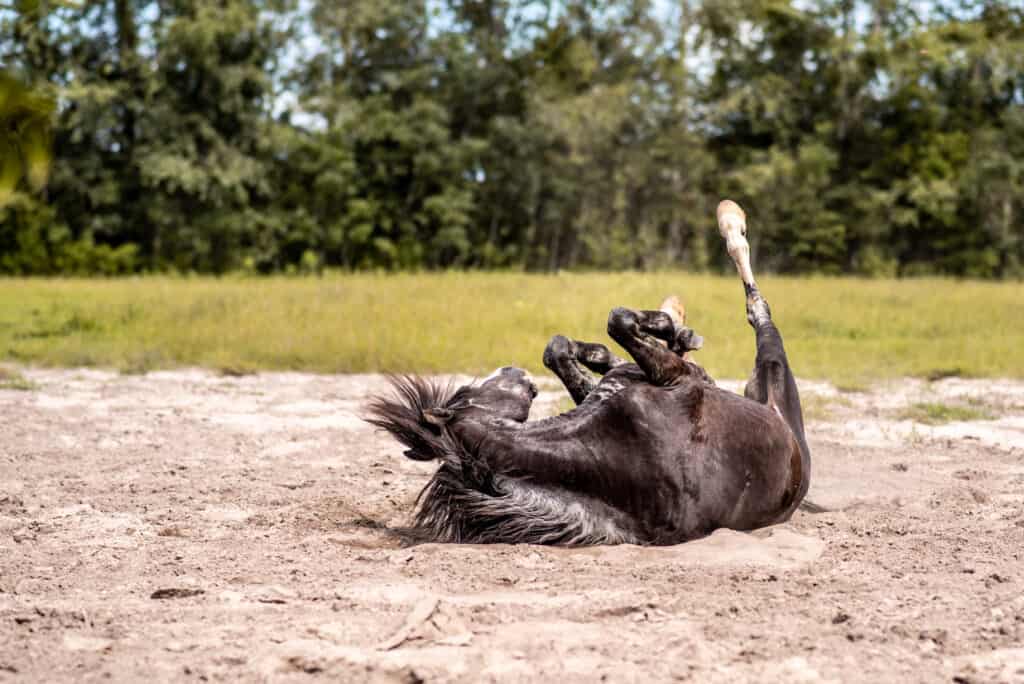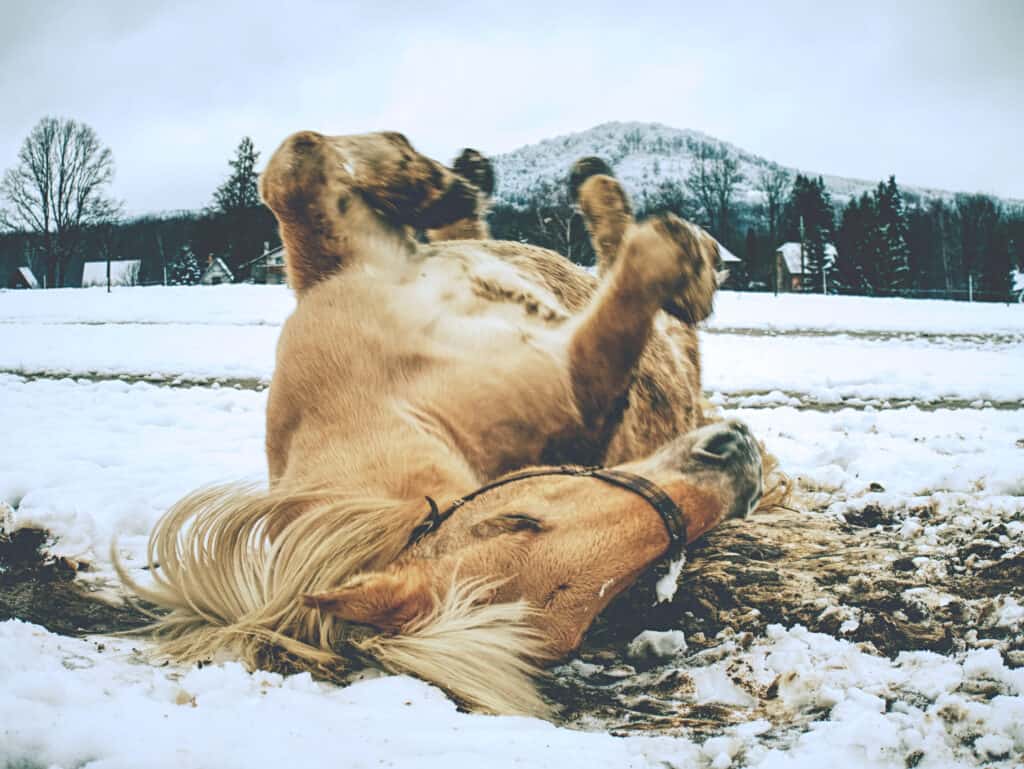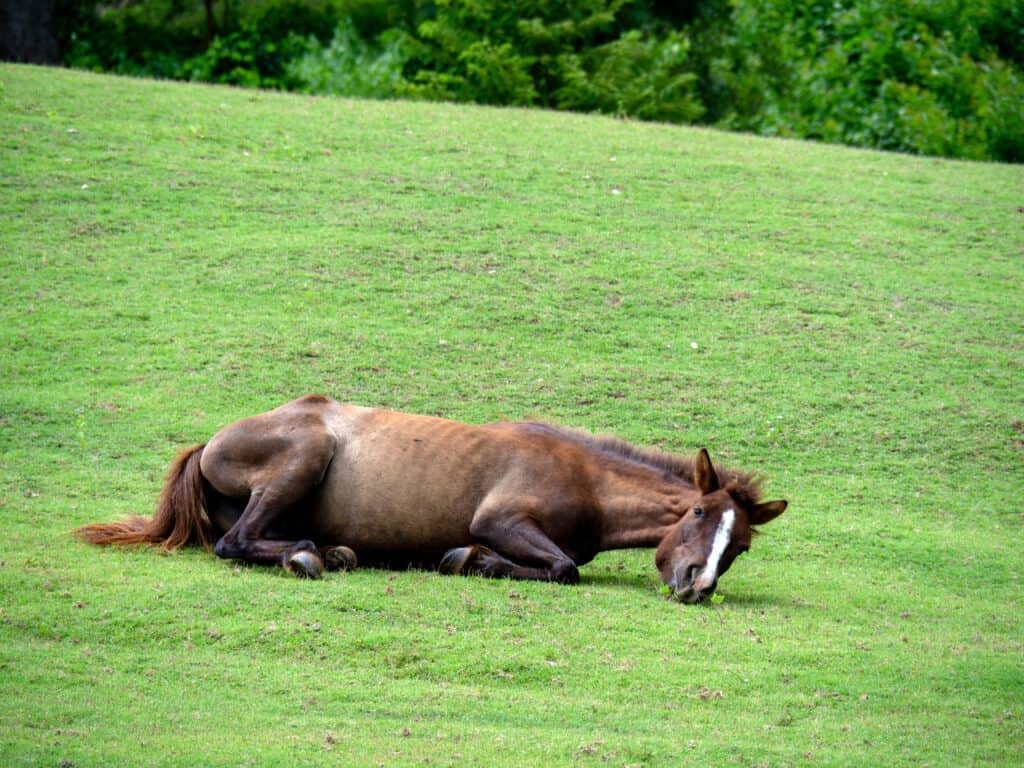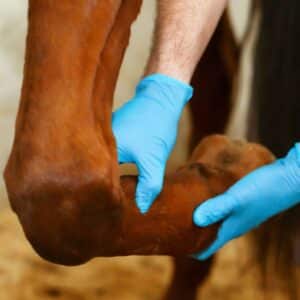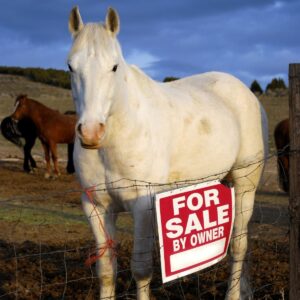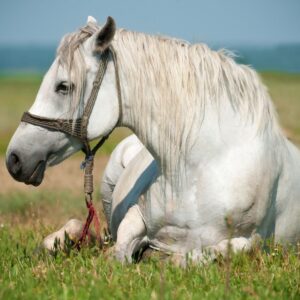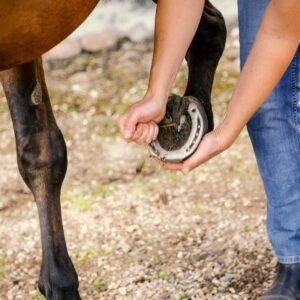When a horse bends its front legs and lays down to roll, it is usually natural and healthy. However, there are times rolling can indicate health-related problems we should be aware of. Read on to learn more about why horses like to roll on their backs and when to be concerned about it.
It is Natural and Healthy for a Horse to Roll
Have you ever had an itch in on your back that you can’t quite reach? Rubbing on a door jamb to get rid of that pesky itch can feel good. Horses lay down and roll to get rid of an annoying itch. The itch could be caused by sweat, bug bites, residual grooming products, etc. Misplaced hairs or ruffed up skin caused by tack can be itchy when the tack is removed. Imagine you are wearing pants that are too tight at the waistline.
As much as we want our horses to stay clean, dust and mud have benefits for horses. The dust and mud accumulated on the hair coat and skin after a good roll will provide some protection from bugs. Mud and water are a good way for a horse to cool off in the heat of the summer, too.
After a hard workout, a nice massage can be a relief for tight, sore muscles. Horses can’t ask us to call the masseuse to work her magic, so they will find a nice place to roll so they can relieve tight muscles.
It can be aggravating to give a horse a bath, then they immediately find what seems like the dirtiest place, and roll. There are two theories as to why this happens. The first theory is after a bath, the hairs don’t feel right, and they want to make it feel normal again. The other view is that the grooming products did not get rinsed out enough, or make the horse itch. Horses can be allergic to some products. You can learn more about How Often Should I Bathe My Horse here.
Horses shed their winter coats when the temperatures start to rise. If they are wearing a blanket that is too hot for the season, they will sweat under the blanket. Both situations can result in a horse either rolling to release excess hair or relieve itching caused by the sweat.
When to Investigate Horse Rolling Further
If a horse is trying to lay down or refuses to go forward when ridden, you need to investigate further the cause for your horse wanting to roll. Like we discuss in our article on What Causes Cold Back in Horses and Ways to Help, the first thing to check is for pain. Does your tack fit correctly? Make sure there are not any protruding areas on the underside of the saddle. If the tack passes inspection, a veterinarian or an equine chiropractor might need to be consulted.
When a Horse Rolling is a Problem
Unfortunately, there are times that rolling can either cause problems or be a sign of colic. Horses that are stalled can lay down and get cast up against the wall of the stall. Cast is when the horse is too close to the wall and cannot get their legs in a good position to get themselves back up. If they end up cast because of rolling, they can be stuck on their backs. For a fight and flight prey animal, being stuck on its back and unable to get up incites a panic reaction. Some calm and trusting horses will allow you to help them without too much fuss. But, the legs of a panicky horse can be dangerous in this situation.
To help a horse that is cast, try and get them to calm down enough for you to get ropes on the legs closest to the wall. Gently roll the horse, so his legs are facing away from the wall. The ropes need to be long enough for you to be across the stall. You want to be out of the way when your horse is rolled over and able to rise.
Injury from being cast will depend on how long they were cast and how much they fought to get up. It can range from muscle strain to cuts and bruises, and possibly needing an equine chiropractor.
Rolling can be a sign of the equine dreaded “c” word, colic. As many horse people already know, colic is a stomachache in horses. One of the clinical signs of colic is repeatedly getting down and up, combined with violent rolling. If your horse is doing this and displaying other clinical signs, you need to call your veterinarian. Here is a partial list of clinical signs of colic:
- Repeatedly getting down and up, combined with violent rolling
- Looking at, kicking, biting the abdomen
- Stretching out as if to urinate, but not urinating
- Lack of bowel movement
- Lack of digestive sounds
- Elevated respiration and pulse rate
- Sweating
Horse Courses by Elaine Heney
- Listening to the Horse - The Documentary by Elaine Heney & Grey Pony Films
- Shoulder In & Out Training for better balance, bend & topline development with your horse
- Over 110+ Polework Exercises & Challenges to Download
- Dancing at Liberty & Creating Connection with Your Horse (11 lessons) - Grey Pony Films
Final Thoughts:
Most of the time, when a horse rolls, it is a natural and healthy action. However, there are times we need to investigate further the reasons for the rolling, as it may be caused by pain or illness.

